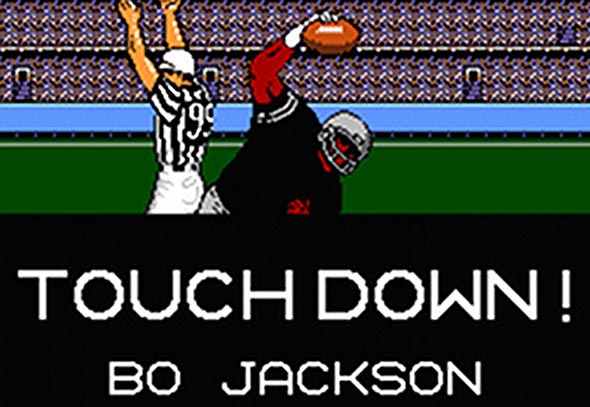Bo Knows Tecmo Bowl
 I recently watched an ESPN ’30 for 30′ documentary about Bo Jackson entitled You Don’t Know Bo all about multi-sports superstar Bo Jackson. For those who, well, don’t know Bo, he was a phenomenal high school and college athlete who decided to play both professional baseball and professional football, and he excelled at both. He became a pitch man for Nike, and their “Bo Knows…” campaign helped to change sports marketing forever.
I recently watched an ESPN ’30 for 30′ documentary about Bo Jackson entitled You Don’t Know Bo all about multi-sports superstar Bo Jackson. For those who, well, don’t know Bo, he was a phenomenal high school and college athlete who decided to play both professional baseball and professional football, and he excelled at both. He became a pitch man for Nike, and their “Bo Knows…” campaign helped to change sports marketing forever.
As the documentary points out, Bo’s unparalleled ability, and his quiet, at times subdued personality, helped to propel him to the level of mythical hero in his own time — there are stories of young Jackson leaping 40 foot ditches and killing boar with skipped stones. He was encouraging legend even as he was performing real remarkable and never before witnessed feats on the football and baseball fields.
One fo the most interesting segments of the documentary (which is on Netflix now, and I highly recommend) is when the various personalities compiled to talk about Bo turn their attention to Tecmo Bowl.
Yes, for those who don’t, um, know (sorry), Bo and his team the LA Raiders are in the 1989 NES sports videogame classic. Bo is the equivalent of a god in the game, with unmatched speed and power, such that the game has only one play that utilizes him, lest the team selection be horribly unbalanced. Played right, he is literally uncatchable. Bo is so good, the Raiders rarely get used in competitive play of Tecmo Bowl, or it’s brother, Tecmo Super Bowl.
http://www.youtube.com/watch?v=a3PaLzvy_IA
The interviewees in the documentary point to the dominance of Bo in Tecmo Bowl as a definitive example of how far Jackson’s dominance reached into popular culture. On the one hand, it is an interesting point that few other sports superstars got a similar treatment in sports videogames of the time. That Bo is so ridiculously dominant in Tecmo Bowl and Tecmo Super Bowl shows, as Chuck Klosterman suggests, that even the Japanese developers who were working on the game understood just who he was as a player.
It’s an interesting question, just how the abstraction of a player’s ability plays out in a sports videogame, and more specifically, how that abstraction may represent a combination of both the real ability of the player and the cultural perception of that player’s ability. Player’s who play sports care a lot about how they are represented in the game, not just graphically, but also in terms of their skills as an athlete. There are many stories of NFL players being upset because they feel their rating in Madden are undervalued. Not only are physical abilities or traits of players abstracted in these games, as often mental or emotional traits like generic “personality” or “consistency” are assigned to players too.
There is also the question of how the ratings of players can influence the balance of a videogame, something designers take very seriously. Players of sports videogmaes generally expect that there will not be perfectly balanced teams in a game, but there is also the expectation that any team might be able to win any given game.
And then there’s Bo. Bo who broke a baseball bat on his head. Bo who ran up an outfield wall. Bo, who ran so fast, he continued through the endzone and into the locker room tunnel to stop. Bo who plowed over the mouthy, trash-talking Brian Bosworth for a touchdown. Indeed, Bo in Tecmo Bowl may be an accurate reflection of his unbelievable ability. Then again, he also dunked a stick on a basketball hoop in 6th grade, or so they say.
